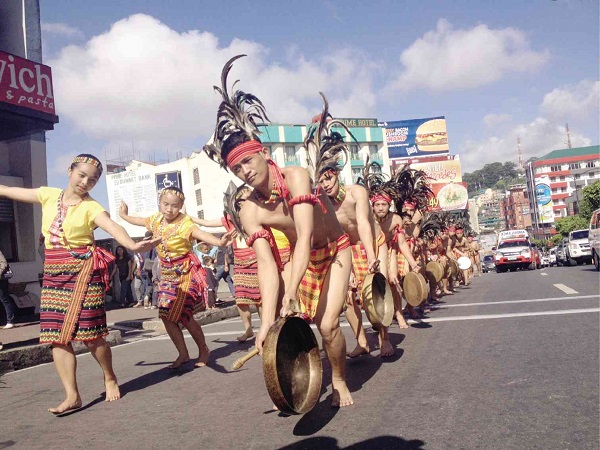
SATURDAY was a quiet day for Baguio residents, because college children had left for their semestral break, until about 80 Cordillera performers, young and old, banged gongs as they danced through downtown. The performers bore no signs as they cut through traffic to reach the Baguio Cathedral for a gong festival. They relied on gongs, which traditionally draw the community to a feast. VINCENT CABREZA/INQUIRER NORTHERN LUZON
BAGUIO CITY—Residents and visitors on Saturday were captivated by a long line of men wearing g-string and women in “tapis” (cordillera skirt) who cut through morning traffic in downtown Baguio and danced to the loud beating of gongs.
The performers, some as young as 3 years old, made their way to the Baguio Cathedral to hold a unity gong festival that was sponsored by the city government. The gongs were meant to draw participants, much like how elders
assemble upland villagers.
But many of the city officials were absent, having attended a closed-door meeting between Cordillera leaders representing the Cordillera Regional Development Council (RDC) and Budget Secretary Florencio Abad over budgetary reforms.
The RDC proposed the creation of a Regional Development Fund to be infused with money allocated to the suspended Priority Development Assistance Fund or the pork barrel.
Reporters were barred from covering the Baguio Country Club meeting, which included Baguio Mayor Mauricio Domogan, Benguet Gov. Nestor Fongwan, Ifugao Gov. Denis Habawel and Baguio Rep. Nicasio Aliping Jr.
But documents supplied by government sources showed that the RDC had complained to Abad because the upland provinces never get equitable resource allocations, not even after undergoing consultations prescribed by budget officials to justify higher spending plans for upland communities.
Lowest share
The Cordillera is receiving about P30 billion, the lowest share from next year’s General Appropriations Act, despite having posted a 1-percent growth in the 2012 Gross Regional Domestic Product, which measures the upland region’s value of goods and services, according to the Department of Budget and Management (DBM).
RDC officials complained that the central offices of the various line agencies serving the regions are also to blame for the allocations.
They said the DBM allows the agencies’ central offices to list their spending priorities, which are often made before it asks the regions to offer spending suggestions.
Abad has implemented a series of DBM reforms to improve the allocation of the national government’s annual revenues, following the outrage over the misuse of the pork barrel.
Nuances
But the RDC said the budget process ignores “the nuances of a mountainous region, such as the dispersed and low populations [and the] difficulty and high cost [of] providing government goods and services.”
The RDC cited as an example the budgeting process for irrigation.
“The Cordillera’s agricultural lands in the uplands are considered [not viable for] irrigation since these farms lie on steep slopes,” the RDC document said. Vincent Cabreza, Inquirer Northern Luzon